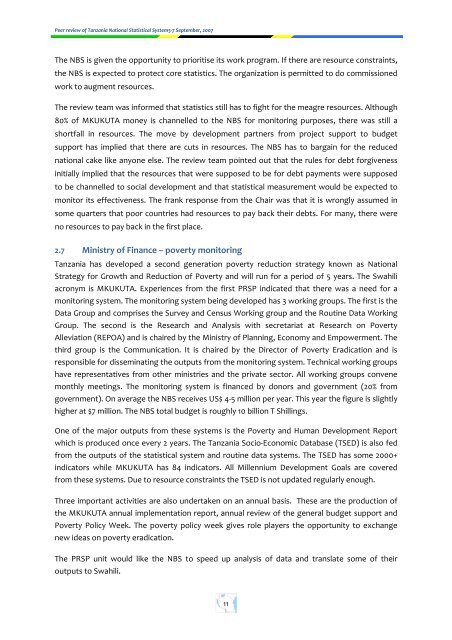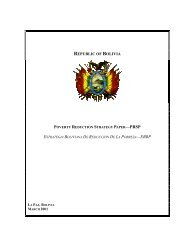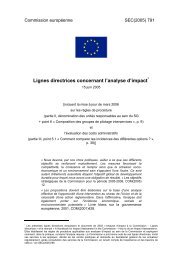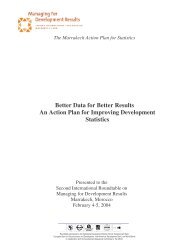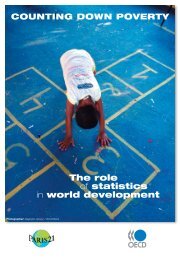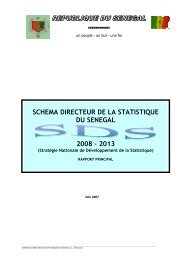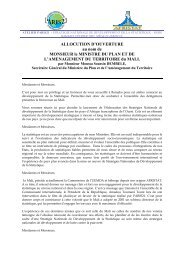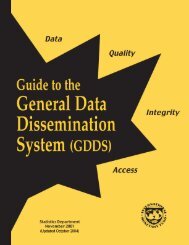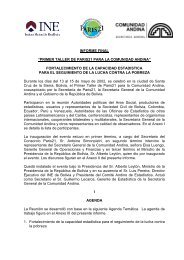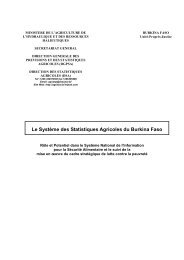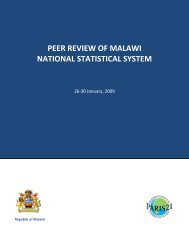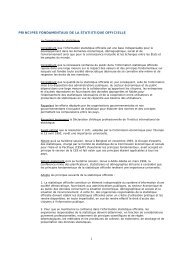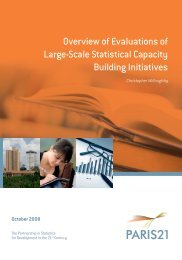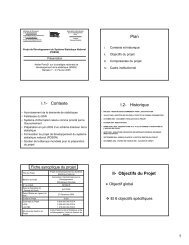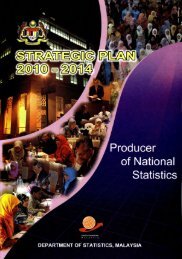Peer Review of Tanzania National Statistical System - Paris21
Peer Review of Tanzania National Statistical System - Paris21
Peer Review of Tanzania National Statistical System - Paris21
You also want an ePaper? Increase the reach of your titles
YUMPU automatically turns print PDFs into web optimized ePapers that Google loves.
<strong>Peer</strong> review <strong>of</strong> <strong>Tanzania</strong> <strong>National</strong> <strong>Statistical</strong> <strong>System</strong>5‐7 September, 2007<br />
The NBS is given the opportunity to prioritise its work program. If there are resource constraints,<br />
the NBS is expected to protect core statistics. The organization is permitted to do commissioned<br />
work to augment resources.<br />
The review team was informed that statistics still has to fight for the meagre resources. Although<br />
80% <strong>of</strong> MKUKUTA money is channelled to the NBS for monitoring purposes, there was still a<br />
shortfall in resources. The move by development partners from project support to budget<br />
support has implied that there are cuts in resources. The NBS has to bargain for the reduced<br />
national cake like anyone else. The review team pointed out that the rules for debt forgiveness<br />
initially implied that the resources that were supposed to be for debt payments were supposed<br />
to be channelled to social development and that statistical measurement would be expected to<br />
monitor its effectiveness. The frank response from the Chair was that it is wrongly assumed in<br />
some quarters that poor countries had resources to pay back their debts. For many, there were<br />
no resources to pay back in the first place.<br />
2.7 Ministry <strong>of</strong> Finance – poverty monitoring<br />
<strong>Tanzania</strong> has developed a second generation poverty reduction strategy known as <strong>National</strong><br />
Strategy for Growth and Reduction <strong>of</strong> Poverty and will run for a period <strong>of</strong> 5 years. The Swahili<br />
acronym is MKUKUTA. Experiences from the first PRSP indicated that there was a need for a<br />
monitoring system. The monitoring system being developed has 3 working groups. The first is the<br />
Data Group and comprises the Survey and Census Working group and the Routine Data Working<br />
Group. The second is the Research and Analysis with secretariat at Research on Poverty<br />
Alleviation (REPOA) and is chaired by the Ministry <strong>of</strong> Planning, Economy and Empowerment. The<br />
third group is the Communication. It is chaired by the Director <strong>of</strong> Poverty Eradication and is<br />
responsible for disseminating the outputs from the monitoring system. Technical working groups<br />
have representatives from other ministries and the private sector. All working groups convene<br />
monthly meetings. The monitoring system is financed by donors and government (20% from<br />
government). On average the NBS receives US$ 4‐5 million per year. This year the figure is slightly<br />
higher at $7 million. The NBS total budget is roughly 10 billion T Shillings.<br />
One <strong>of</strong> the major outputs from these systems is the Poverty and Human Development Report<br />
which is produced once every 2 years. The <strong>Tanzania</strong> Socio‐Economic Database (TSED) is also fed<br />
from the outputs <strong>of</strong> the statistical system and routine data systems. The TSED has some 2000+<br />
indicators while MKUKUTA has 84 indicators. All Millennium Development Goals are covered<br />
from these systems. Due to resource constraints the TSED is not updated regularly enough.<br />
Three important activities are also undertaken on an annual basis. These are the production <strong>of</strong><br />
the MKUKUTA annual implementation report, annual review <strong>of</strong> the general budget support and<br />
Poverty Policy Week. The poverty policy week gives role players the opportunity to exchange<br />
new ideas on poverty eradication.<br />
The PRSP unit would like the NBS to speed up analysis <strong>of</strong> data and translate some <strong>of</strong> their<br />
outputs to Swahili.<br />
11


